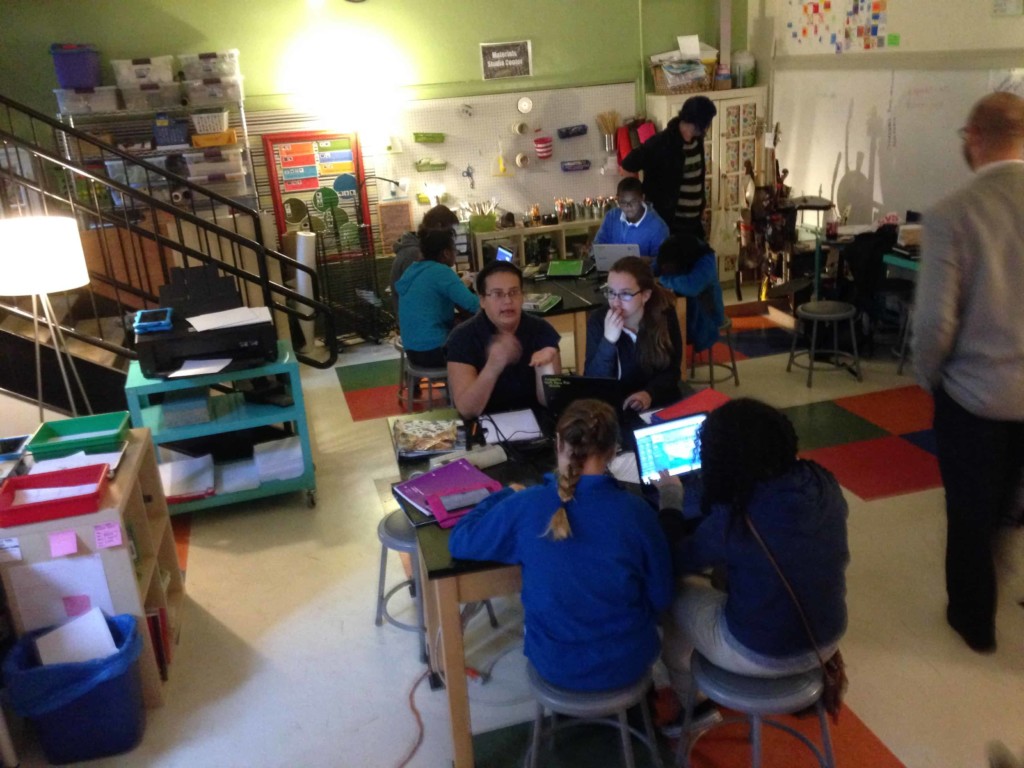Good Work: Grateful for 5 Signs of Progress

In the last few weeks I’ve visited a couple remarkable schools while attending some great meetings. The Environmental Charter School (@ECSinnovator) in Pittsburgh is a good example of a school promoting Deeper Learning with powerful questions and applied learning–often in 561 acre Frick Park next door. The featured image is the Thinking Lab–a cool art and STEM mash-up space.
At the Three Rivers Educational Technology Conference (#TRETC2014), I spoke about 10 EdTech Impact Opportunities and Deeper Learning strategies including Posting, Publishing, Presentation, & Portfolio.
In New Orleans, I visited Arthur Ashe Charter School, where Firstline Schools is introducing NOLA to blended learning. The lab rotation model–featuring i-Ready, Think Through Math and ST Math–is showing promising results. With our friends at 4.0 Schools, we co-hosted a Smart Cities Summit (like the Smart Cities discussion at #iNACOL14).
In DC we took two dozen policy makers to Hart Middle School where the individual rotation math program is powered by New Classrooms. We saw a great station rotation model at Ketcham Middle school powered by CityBridge Fellows. Reflecting on the school visits, we co-hosted a policy hackathon with the ExcelinEd team. We closed last week by extracting 10 Lessons from the National Summit on EdReform.
5 Signs of Progress. The opportunity to visit great schools with smart people is a real gift–and a sign of progress. With a month left in 2014, it’s clear we’ve seen progress in five area:
- Student access to internet devices dramatically improve–at school and at home. Most districts dropped their cell phone bans and gave teachers the option to bring their own device (BYOD) to school.
- Next gen schools have popped up everywhere, many supported by NGLC grants and networks (see 100 Schools Worth Visiting).
- Districts making progress as a result of skilled leadership, foundation grants, and supportive networks (see 25 Districts Worth Visiting).
- EdTech investment continues to support entrepreneurship, new apps, and broader adoption.
- Affordable HigherEd options continue to proliferate. We visited College for America from SNHU last month and like the competency-based model and focus on low wage workers.
We’re also seeing more people talking about cities as the most promising locus of progress including a World Bank conference earlier this month. Check out #SmartCities for an interesting dialog between planners, civic leaders, and technologist–and a few of us interested in the role of learning ecosystems. We see urban partnerships attacking poverty and developing talent. We hope you’re part of sparking an urban revolution.
What progress has made you grateful this year?
Curriculum Associates, MIND Research Institute, and ExcelinEd are Getting Smart Advocacy Partners.







Brenda Martin
This is so informative and encouraging! it's interesting that the 20 schools you profiled share 10 characteristics that appear to promote Deeper Learning: Good Goals, Equity Focus, Powerful designs, Teacher support, Show what you know opportunities, Strong culture, Good habits, Sense of place, Powerful projects and Great questions. I also appreciate that there were also 6 characteristics shared that showed support that promoted more success in low-income schools: Shared equity focus, Recognized but not trapped by tests, Use quality assessments to encourage quality instruction, Scaffolding Project-Based Learning, Provided fortified environments and Provided connections while asking big questions.
Thank you for clarifying the Myths that Deeper Learning is just for suburban schools, honor students, native English learners, Superstar Teachers, High performing schools, College-going communities, and costs more! i am grateful for this informative Aricle and report: http://cdno.gettingsmart.com/wp-content/uploads/2013/12/DLForEveryStudent_FINAL.pdf.